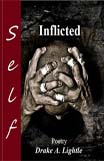April 10, 2011SELF-INFLICTED
Review by Jéanpaul Ferro 
Goldfish Press
500 E. Magnolia Avenue
Eustis, Florida 32726
ISBN 9780982466933
2011, 184 pp., $16.95
www.Goldfishpress.com
Missouri native Drake A. Lightle’s debut collection of poetry, Self-Inflicted, is one of those rare debuts where the frankness may be as raw and honest as a dying man’s last words. In this age of instant communication, information overload, and train-of-thought/seat-of-your-pants-living, Drake A. Lightle puts a stake in the ground and lets his mind’s wanderings ripple out into a prose that is exactly as his mind sees things. Quotes, snippets of thought, cliff notes, chemical mutations, and conversations all become one almost like a dazzling Charles Bukowski on methamphetamine.
In his prose, Lightle can draw us down into those elementary particles where sometimes God co-mingles with his own creations: “something akin to free will yet governed by universal laws and truths / god dwells hungrily in the sub-atomic tapestry of commingling flesh.” Or he can simply take us to a Sheraton Hotel bar, where there is a married woman and a night full of possibilities: “we’re here with the hipsters / and gangsters / and yuppie yippie wanksters / trying to blend in / to the scenery / you drinking wine / me drinking vodka / and thinking about where we really should be / somewhere else.”
Self-Inflicted is both a journey and map of the human soul. Everything is covered here: the pain and loss of every human failing, the search for self and the reason for life’s existence, the bitterness at looking all around out beyond your own pale space where this infinite color exists but only as walls to keep you in. This is most evident in the poem “A Lust For Insomnia”:
I’ve seen the sunrise more times than I’ve been awakened
by it these past six months.
I have forsaken respite and embraced the notion that
time is illusion hiding in shadows of self—
a gentle volley of light and dark
through the blue-hued portals of efficacy
broken into spectral radiance.
There certainly is an underlining theme of hope and wonder within Self-Inflicted, but these hopes always seemed to get dashed as though there is a good Lightle and a bad Lightle at war with one another. And within this war of his own demons, Drake A. Lightle seems to have captured another war, one of someone who is caught within the mechanisms of the machine—a place where you are born, but one in which you can never get out of. This conflict is best demonstrated in the amusingly entitled “USER_DELETED (Monkey Edit: Short Re-Mix)”:
two buildings,
each filled with row after row
of cubicles,
with skies of buzzing florescent light
casting soft whiteness on gray faces
sitting in chairs at desks
in front of more buzzing light
from monitors;fingers surgically attached to keyboards;
eyes reading words of desperate prayers –
poems and prose and plays and short stories
and novels spilling from the minds of monkeys
banging on keyboards in a virtual zoo –monkeys searching for truth and meaning
in experience,
meaning of hate and despair and sorrow
and love and hope and bliss;monkeys freezing in the shadow of the monolith of life
desperate to make sense of it all.
In the end, Lightle surmises the inevitable: “There was blood on the sheets / There was blood on the pillow.” And the machine wins out again. And the human self is lost in a gray world where each person is simply mortar and brick to feed the soul of something much larger than any one individual. Yet in the title piece, “Self-Inflicted” the epiphany is something so much more simple: “I blame it on appetite.”
Self-Inflicted is a gritty, granular illumination of self chosen pain. Like most of us, Drake A. Lightle has painted the town, wrote it all down, and in the end, like a very wise man, has asked for redemption. The blood trail in getting to this place is written all over this book. All you have to do is go along on his very haunted ride.